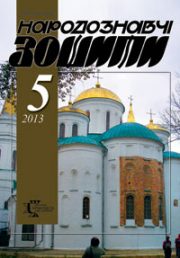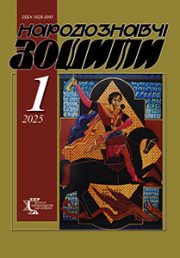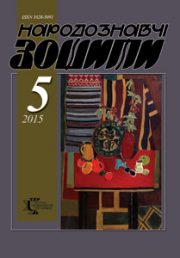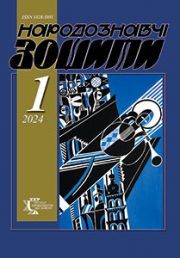The Ethnology Notebooks. 2020. № 5 (155), 1213—1225
UDK 94:811.16:81’373.21(477.83)
DOI https://doi.org/10.15407/nz2020.05.1213
TARAS Yaroslav
- ORCID ID: https://orcid.org/0000-0001-7241-9466
- Doctor of Historical Sciences, Professor
- The Ethnology Institute of the National Academy
- of Sciences of Ukraine,
- Head of the Department of Ethnology,
- 15, Prospekt Svobody, 79000, Lviv, Ukraine,
- Contacts: е-mail: etnomod@ukr.net
Abstract. The article deals with information about the tribal union of Duliby, analyzes the chronicles and printed sources of the XVI — early XXI centuries, illuminates the significance and origin of Duliby ethnonyms, concludes that among scientists there is no unambiguous understanding on the territory of the settlement of Duliby and the origin of the names of the settlement of the Duliby district of Lviv region. It is found out that scientists are on two positions on the settlement of Duliby. It could appear during the ancient hegemony of Dulibov in this region in the XI—XII centuries, or in the XII century; during the Galician-Volyn wars, and wars of Volodymyr Volodarovych or Yaroslav Osmomysl with Kyiv princes as a settlement of captured Volynians.
To identifying the origin of the village Duliby, the names recorded in the Josephinsky and Franciscan metrics were analyzed. For the first time, autochthonous surnames of Dulibchians of the Strysky district of the XVIII — the beginning of the XIX century, were analyzed formation, it was found that they are rare, uncharacteristic for Western Ukraine, are distributed in the central, eastern parts of Ukraine. Based on the analysis of the surnames confirmed the hypothesis that is the Duliby of the Strysky district was populated by the Galician princes from Volyn and lands that were subordinated to the Kyivan princes. The comparative analysis of the surnames of the end of the XVIII century is made. With the names of Dulibchians at the beginning of the XXI century, it has been established that compared to the Josephian and Franciscan metrics, the number of surnames as of 2017 increased by 10 times, the most numerous surnames are presented. It is also shown that autochnotic surnames are lost, or they are on a critical loss limit.
Keywords: Duliby, Volyn, village of Duliby, Strysky district, Lviv region, Chronicle Slavic tribes, Josephian, Franciscan metrics.
Received 21.10.2020
REFERENCES
- Chronicle Ruthenian after Hypatian Codex. Trans. L.E. Makhnovets. Kyiv: Dnipro [in Ukrainian].
- Terletskyi, L. Ethnogenesis of the Ukrainian people. Lviv: Intelekt-Biznes [in Ukrainian].
- Guagnini, A. (2007). European Sarmatia Chronicles. Kyiv: Kyievo-Mohylians’ka akademiia [in Ukrainian].
- Tyschenko, K.M. (2003). Keltski etymolohii. I. Etnos. Movoznavstvo, 4, 3—16 [in Ukrainian].
- Petrushevich, A. (1893). Lingvistichesko-istoricheskіja izsledovaniіja o nachatkah goroda L’vova i okrestnostej ego, s vozrѣnіem na predistoricheskіja vremena pereselenіja slovenskih i rumynskih plemen iz pridunajskih stran v predkarpatskіja oblasti (Issue I—II). Lvov: Izhdivenіem Instituta «Narodnij Dom» [in Russian].
- Sedov, V.V. (1979). The origin and early history of the Slavs. Moscow: Science [in Russian].
- M. Hrushevsky. (1994). History of Ukraine-Rus’ (Vol. 1). Kyiv: Naukova dumka [in Ukrainian].
- Tyschenko, K. (2006). Pokhodzhennia nazv litopysnykh slovianskykh plemen. Narodna tvorchist ta etnohrafiia, 1, 4—16 [in Ukrainian].
- Popov, A.I. (1973). Names of the Peoples of the USSR: An Introduction to Ethnonymics. Leningrad: Nauka [in Russian].
- Fasmer, M. Russian Etymological Dictionary. Moscow: Progress (Vol. 1) [in Russian].
- Geiriadur Prifysgol Cymru. A Dictionary of the Welsh Language: in 4 vols. Cardiff, 1967—2002.
- Trubachev, O.N. Ethnogenesis and culture of the ancient Slavs. Linguistic research. Moscow: Science [in Russian].
- Lowmianski, H. (1967). Poczаtki Polski: z dziejоw Slowian w I tysiаcleciu n. e. (Vol. 3). Warszawa: Panstwowe Wydawnictwo Naukowe [in Polish].
- Nykonov, V.A. (1983). Tipologija slavjanskoj antroponimii. Istorija, kultura, jetnografija i folklor slavjanskih narodov: IX Mezhdunarodnyj sjezd slavistov. Doklady sovetskoj delegacii. Moskva: Nauka [in Russian].
- Polnoe sobranie russkih letopisej (Vol. 1): Lavrentevskaja letopis (Issue1–3). Leningrad: Izdatelstvo Akademii Nauk SSSR [in Russian].
- Mishko, S. (1981). Essay on the early history of Rus-Ukraine. Niu-Jork; Toronto; Miunkhen: Ukrainske Istorychne Tovarystvo [in Ukrainian].
- Kliuchevskyj, V.O. (1987). Sochinenija v devjati tomah (Vol. I). Kurs Russkoj istorii (Part1). Moskva: Mysl [in Russian].
- Niderle, L. (1956). Slavic Antiquities. Trans. T. Kovaleva and M. Khazanov. Moscow: Publishers of Foreign Literature [in Russian].
- Derzhavin, N.S. Slavs in antiquity: a cultural and historical essay. Moscow: Publisher of the USSR Academy of Sciences [in Russian].
- Vojtovych, L. (2011). Galician-Volyn sketches. Bila Tserkva: Pshonkivskyj Publ. [in Ukrainian].
- (1875). Akta grodzkie i ziemskie z czasоw Rzeczypospolitej Polskiej: z archiwum tak zwanego bernardynskiego we Lwowie w skutek fundacyi sp. Alexandra hr. Stadnickiego (Vol. 5). Lwow: Druk. Narodowa W. Manieckiego [in Polish].
- Central State Historical Archive in Lviv, Lviv, or TsDIAL). F. 19. Op. XVI. Spr. 53.
- Central State Historical Archive in Lviv, Lviv, or TsDIAL). F. 20. Op. XVI. Od. zb. 242.
- Khudash, M. Ukrainian Carpathian and Precarpathian names of settlements (apelyativ formation). Lviv: Instytut narodoznavstva NAN Ukrainy [in Ukrainian].
- Shankovskyj, L. (1990). Narys istorii Stryjschyny. Stryjschyna: Istorychno-memuarnyj zbirnyk. T. 1 [in Ukrainian].
- Laba, V. (2016). Litopys parafii Duliby. Lviv [in Ukrainian].







